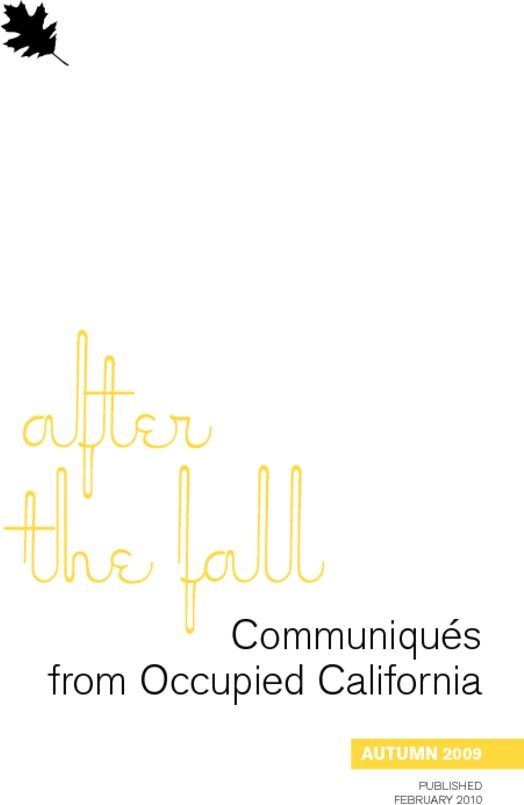After The Fall: Communiqués from Occupied California (2010)
Filed under pamphlet | Tags: · activism, capitalism, education, protest

On March 4, 2010, while representatives of the K-12 schools, community colleges, CSU and UC systems gathered in Sacramento to act out Dr. Seuss and sing “This Little Light of Mine,” students at their respective campuses walked out of classes, occupied buildings and even shut down the Interstate 880/Interstate 980 freeways in Oakland. The students moving from their campuses into buildings and onto the city streets see education as one interconnected piece of the perpetual crises called capitalism. After the Fall: Communiqués From Occupied California collects the major statements of the campus occupations in California in 2009/2010, grounding them in post-World War II U.S. government policy and the growing history of international worker and student occupations.
Publisher: IndyBay.org, February 2010
44 pages
authors
Painting the Glass House Black (Evan Calder Williams, Mute)
Franco “Bifo” Berardi: The Soul At Work. From Alienation to Autonomy (2009)
Filed under book | Tags: · alienation, autonomy, capitalism, labour, philosophy, politics, simulation, theory

“Capital has managed to overcome the dualism of body and soul by establishing a workforce in which everything we mean by the Soul—language, creativity, affects—is mobilized for its own benefit. Industrial production put to work bodies, muscles, and arms. Now, in the sphere of digital technology and cyberculture, exploitation involves the mind, language, and emotions in order to generate value—while our bodies disappear in front of our computer screens.
In this, his newest book, Franco “Bifo” Berardi—key member of the Italian Autonomist movement and a close associate of Félix Guattari—addresses these new forms of estrangement. In the philosophical landscape of the 1960s and 1970s, the Hegelian concept of alienation was used to define the harnessing of subjectivity. The estrangement of workers from their labor, the feeling of alienation they experienced, and their refusal to submit to it became the bases for a human community that remained autonomous from capital. But today a new condition of alienation has taken root in which workers commonly and voluntarily work overtime, the population is tethered to cell phones and Blackberries, debt has become a postmodern form of slavery, and antidepressants are commonly used to meet the unending pressure of production. As a result, the conditions for community have run aground and new philosophical categories are needed. The Soul at Work is a clarion call for a new collective effort to reclaim happiness.
The Soul at Work is Bifo’s long overdue introduction to English-speaking readers. This Semiotext(e) edition is also the book’s first appearance in any language.”
Preface by Jason Smith
Translated by Francesca Cadel, Giuseppina Mecchia
Publisher Semiotext(e), 2009
Foreign Agents series
ISBN 1584350768, 9781584350767
229 pages
Reviews: Michael Goddard (Mute, 2009), Lukas Keefer (Metapsychology, 2011), McKenzie Wark (Public Seminar, 2015).
PDF (thanks to esco_bar, updated on 2017-6-26)
Comments (2)Jodi Dean: Blog Theory: Feedback and Capture in the Circuits of Drive (2010)
Filed under book | Tags: · blogging, blogosphere, capitalism, communicative capitalism, critical theory, facebook, floss, free software, media theory, neoliberalism, psychoanalysis, technology, utopia, web 2.0, youtube

“Blog Theory offers a critical theory of contemporary media. Furthering her account of communicative capitalism, Jodi Dean explores the ways new media practices like blogging and texting capture their users in intensive networks of enjoyment, production, and surveillance. Her wide-ranging and theoretically rich analysis extends from her personal experiences as a blogger, through media histories, to newly emerging social network platforms and applications.
Set against the background of the economic crisis wrought by neoliberalism, the book engages with recent work in contemporary media theory as well as with thinkers such as Giorgio Agamben, Jean Baudrillard, Guy Debord, Jacques Lacan, and Slavoj Zizek. Through these engagements, Dean defends the provocative thesis that reflexivity in complex networks is best understood via the psychoanalytic notion of the drives. She contends, moreover, that reading networks in terms of the drives enables us to grasp their real, human dimension, that is, the feelings and affects that embed us in the system.
In remarkably clear and lucid prose, Dean links seemingly trivial and transitory updates from the new mass culture of the internet to more fundamental changes in subjectivity and politics. Everyday communicative exchanges–from blog posts to text messages–have widespread effects, effects that not only undermine capacities for democracy but also entrap us in circuits of domination.”
Publisher Polity, 2010
ISBN 0745649696, 9780745649696
140 pages
Reviews: Jussi Parikka (Leonardo, 2010), Julia Lupton (LA Review of Books, 2012), Matthew Flisfeder (Reviews in Cultural Theory, 2012), McKenzie Wark (Public Seminar, 2015).
PDF (updated on 2020-5-31)
Comment (0)
